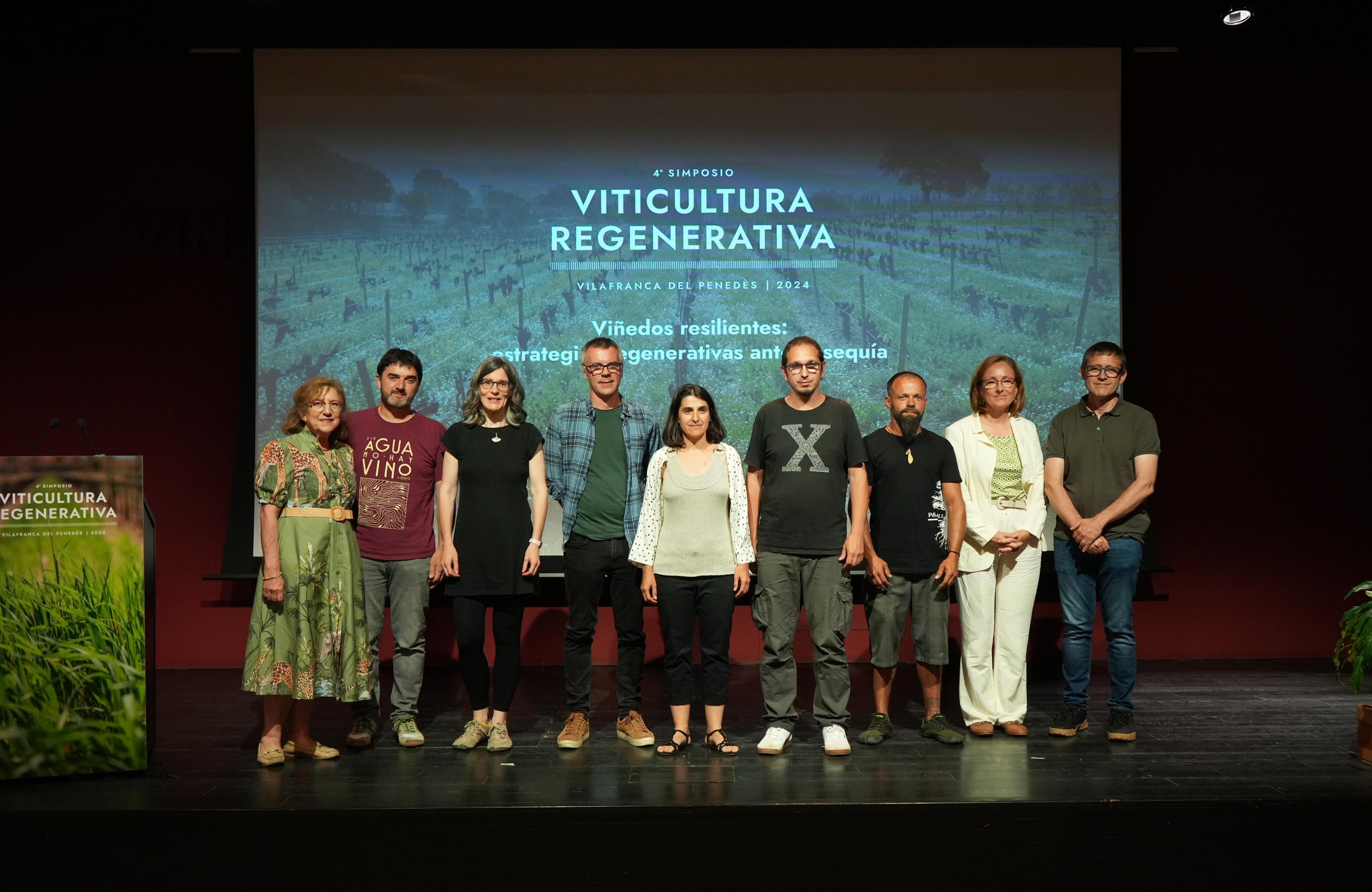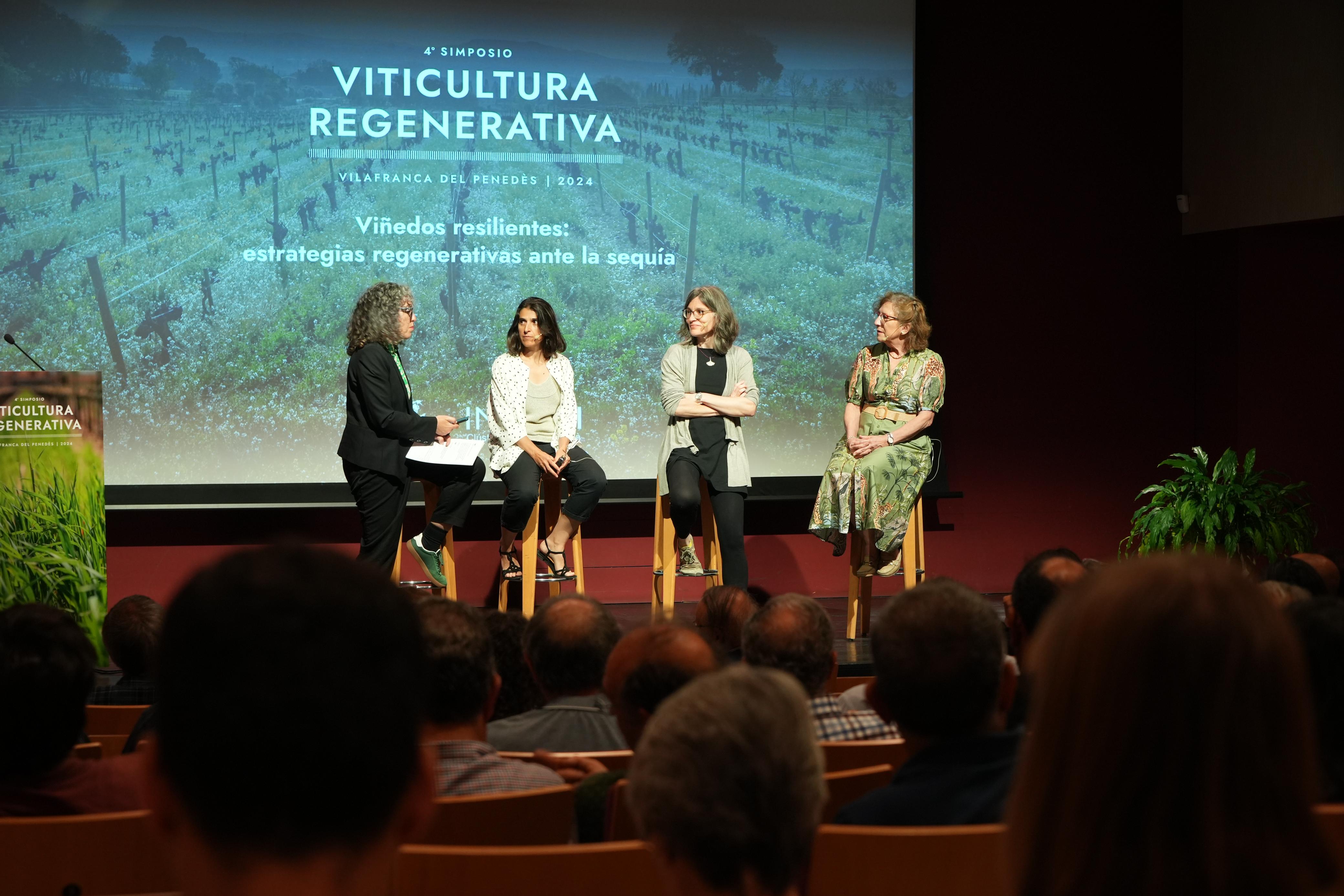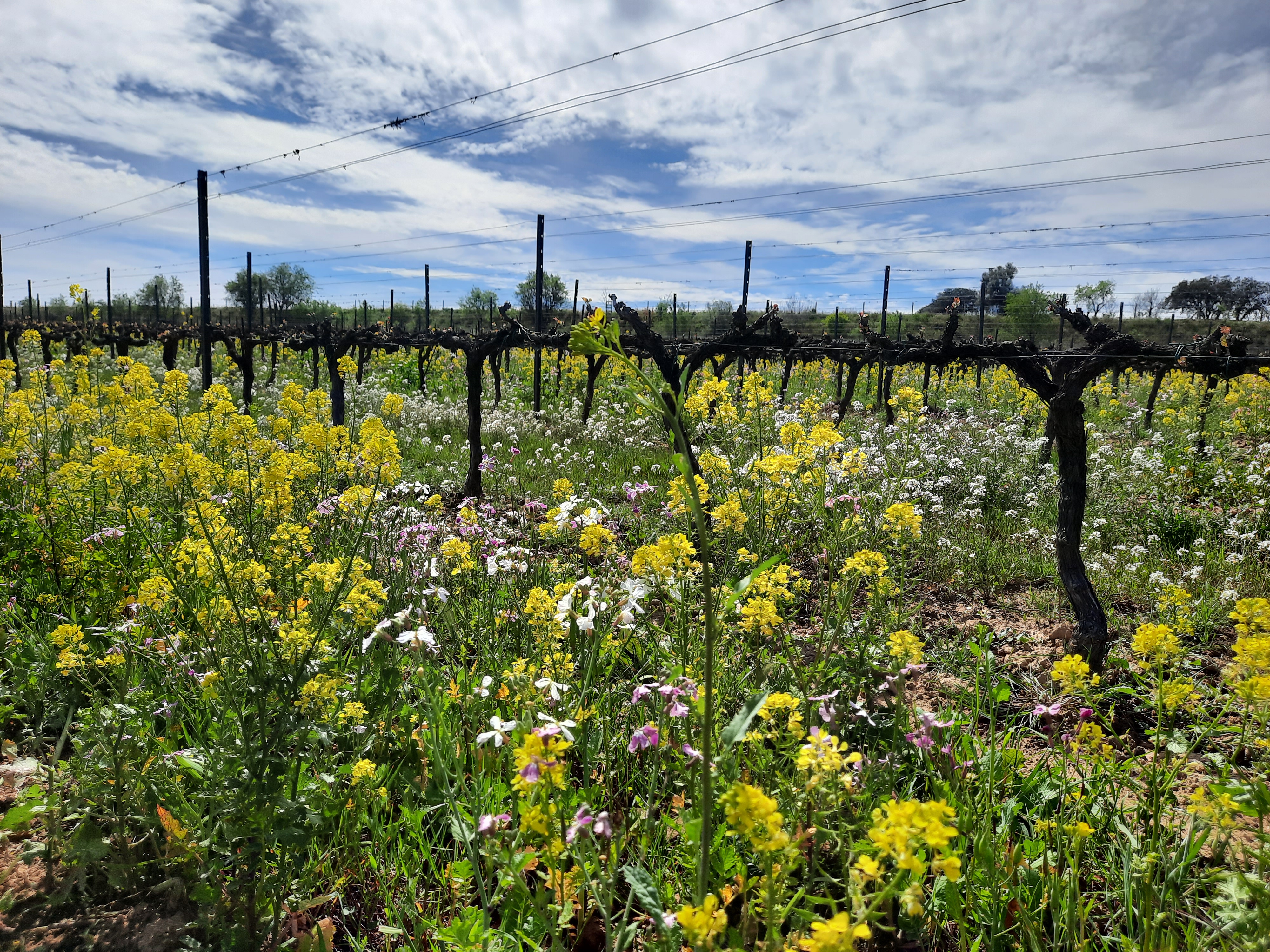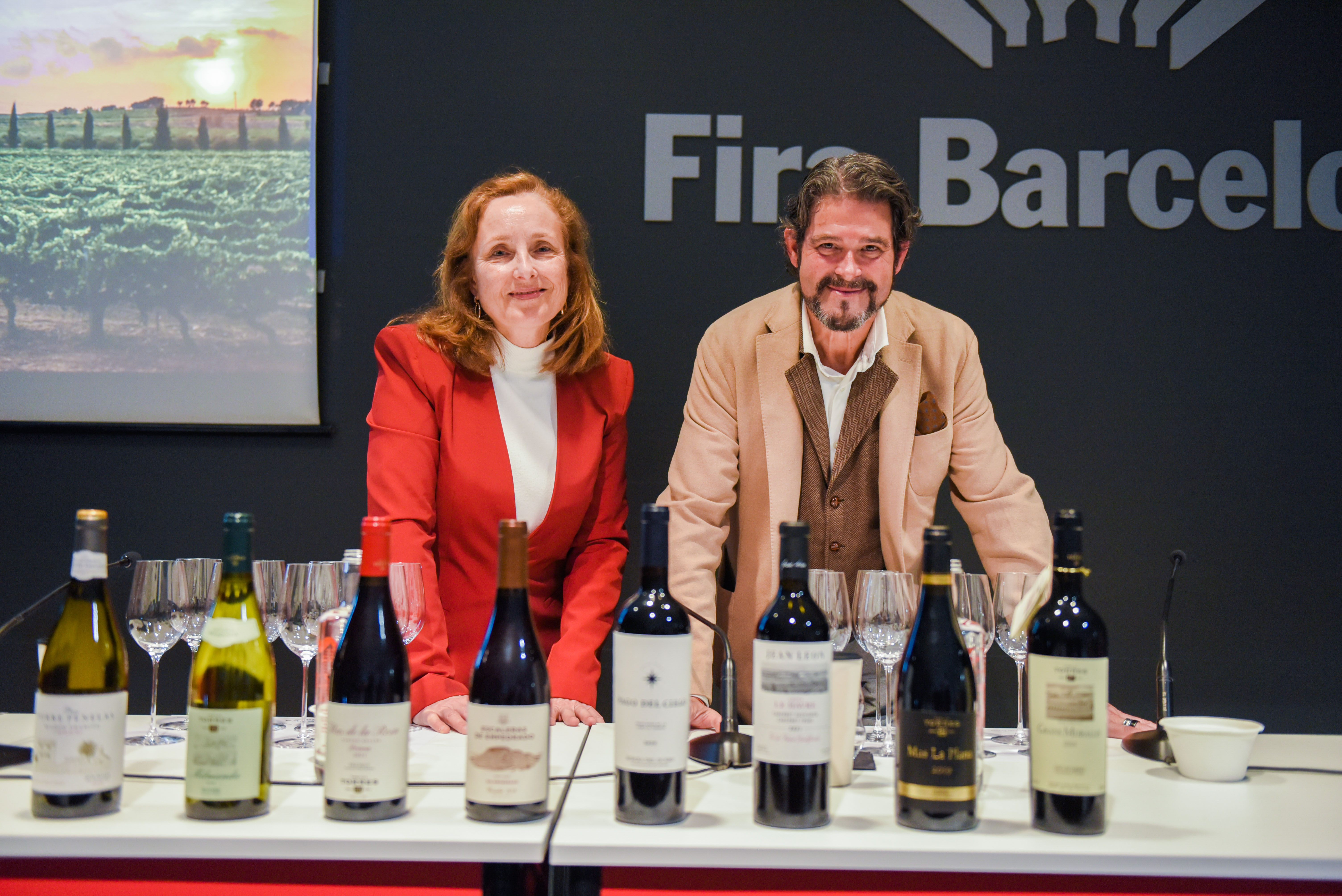Making vineyards more resilient to drought is one of the greatest challenges of the wine industry, and will continue to be so for decades to come. Regenerative agriculture can be a great help in this regard. With this purpose, the 4th Symposium of Regenerative Viticulture was held this Monday, June 3, at the VINSEUM in Vilafranca del Penedès. It was focused on what strategies can be implemented to address the water problem in the best possible conditions.
Organized by the Association of Regenerative Viticulture (AVR) with the support of INNOVI, the symposium has once again brought together experts and academics to delve into those regenerative practices that can help mitigate the impact of droughts and adapt crops to the climate crisis. The event was broadcasted in streaming. Its presenter was the journalist Margalida Ripoll, editor-in-chief of the magazine Arrels. The welcome was given by the Councilor for Economic Promotion and Environment of the City Council of Vilafranca del Penedès, Miquel Medialdea, and the founding partner of the AVR and president of INNOVI, Mireia Torres, who explained how in three years the association has gone from the initial five members to more than a hundred. This is proof that regenerative viticulture, which is based on bringing life back to the soil, is generating more and more interest and is perceived as "the only viticultural model" that makes sense in the current situation.
The scientific vision
The person in charge of opening the presentations, with a first block of a more academic nature, was Dr. Mª Carme Llasat, professor of Atmospheric Physics at the University of Barcelona (UB). As an expert in meteorological risks and climate change, she explained the correlation between these, as well as the agriculture and water resources in the Mediterranean region. Here, "the increase of temperatures is higher than forecasts", a "highly worrying" fact that has a "clear impact" on rainfall, with less water and distributed between droughts and episodes of torrential rain. Llasat, with more than 200 scientific publications on hydrometeorology, climate change and its social impacts, has highlighted the problems that this will cause in a region with a growing population: episodes of scarcity, decrease in water quality... In this scenario, he concluded, solutions such as those provided by regenerative agriculture will be needed.
To specify this situation in the viticulture sector, Dr. Elena Baraza, professor of Ecology at the University of the Balearic Islands (UIB) and researcher at the Institute of Agro-environmental Research and Water Economics, focused her intervention on the mitigation and adaptation strategies to climate change that can be adopted. He said that the situation is "difficult", and it is necessary to "improve water balances", optimising efficiency in the use of water with better management of the landscape, the use of reclaimed water and irrigation systems that are "extremely efficient". At the same time, it is necessary to strengthen the absorption capacity of the soil and prevent loss through evapotranspiration with techniques such as plant covers, agroforestry or the improvement of interaction with the organisms that live in the soil, all of which are proposals that form the core of regenerative agriculture and whose validity has been affirmed by scientific studies. Research into drought-resistant varieties, in addition, will also be key, and that is why intense work is being done, as well as specific phenotypes within the varieties that are currently grown, to ensure the continuity of current wines.
Among the innovative proposals for the future of the sector, one of the most outstanding new concepts is wine agroforestry. The biologist and doctor in agroecology Laura Armengot, an expert in sustainable agricultural practices and agroforestry systems, spoke about this concept. Agroforestry is the inclusion of perennial woody plants – trees, shrubs, palms, bamboos, etc. – and animals in crops. This is an idea very close to traditional Mediterranean agriculture, which since the nineteenth century has been lost to give way to monocultures. This "green desert", as referred to by Armengot, is beginning to change in beneffit of this method, used for centuries: it maintains production and quality, mitigates climate change by lowering the temperature, limits evapotranspiration and improves biodiversity, it increases soil fertility, limits the impact of pests and allows income to be diversified beyond the vineyard with other products.
Concrete examples
From the point of view of the producers, the first to speak was Julián Palacios, a member of a new generation of professionals in love with the vines and who want to respect the environment, preserve ancestral techniques and values work on the land. That is why he founded Viticultura Viva, which helps wineries to improve the balance of the vines and extend the life of the vines. Palacios has emphasized things that "we did not want to see" and agroecology, from a scientific and political approach to "change the base" of the system. Regenerating soils is "essential", he said, but we must avoid "greenwashing" and understand regenerative agriculture in its entirety, not just with what is "fashionable". In this sense, he also spoke of respectful pruning, a key element for resilience both during the formation of the vines and to ensure their survival, and of the importance of recovering green pruning, which has been stopped.
Managing to conserve and make the most of the little water we have, will be one of the main paths for the viticulture of the future. That is precisely what the farmer, rancher and consultant Sergi Caballero, co-founder of the Mas Les Vinyes Cooperative, has talked about. He produces lamb, fruit and vegetables, and believes that, to achieve what he has called the "rehydration of the landscape", it is necessary to "observe the patterns of nature", a long process but one that provides a "solid basis" to learn to relate better to a planet that is changing. Caballero has highlighted the importance of humus, "the payment of the land", which prevents erosion and ensures that it accumulates as much water as possible when it rains. Thus, he concluded, working the land to improve the presence of organic matter is crucial for better soil health and to restore the health of agricultural ecosystems, choosing the most appropriate vegetation cover for each case.
The last presentation was given by Ángel Perurena, a gardener specialising in holistic management, permaculture and regenerative and syntropic agriculture. In his search for a way to produce food that is in harmony with nature, he is bringing ideas from regenerative agroforestry to gardening. Human activity, he explained, is having enormous impacts on world agriculture, and that leads us to a "very difficult" situation. In this, plants and trees are "specialists" in condensing water from the atmosphere, and this can help us recover the increase in humidity that climate change is causing and compensate for the reduction in rainfall. This is an idea that can lead to the design of new, more resilient landscapes with productive agriculture that is also beneficial for the ecosystems where it is developed.
The closing of the day was given by the director of INNOVI, Eloi Montcada; and the vice-president of the AVR, Francesc Font. Montcada, with more than 20 years of experience in sustainability and innovation, has valued the high level of the speakers and the plain way in which they have explained concepts that can sometimes be very complex. For his part, Font, co-founder of AgroAsessor, expert in regenerative and author of several books on the subject, concluded the day by highlighting the role of the association as a "meeting point" where knowledge can be shared, and the importance of the new seal of regenerative viticulture that gives visibility to wineries and winegrowers who are starting out and those who have been regenerating soils for years. This seal is, as Font said, our way of explaining to consumers that "these wines contribute to cooling the planet".
You can view the symposium here (in Spanish): Regenerative Viticulture Symposia and Events





